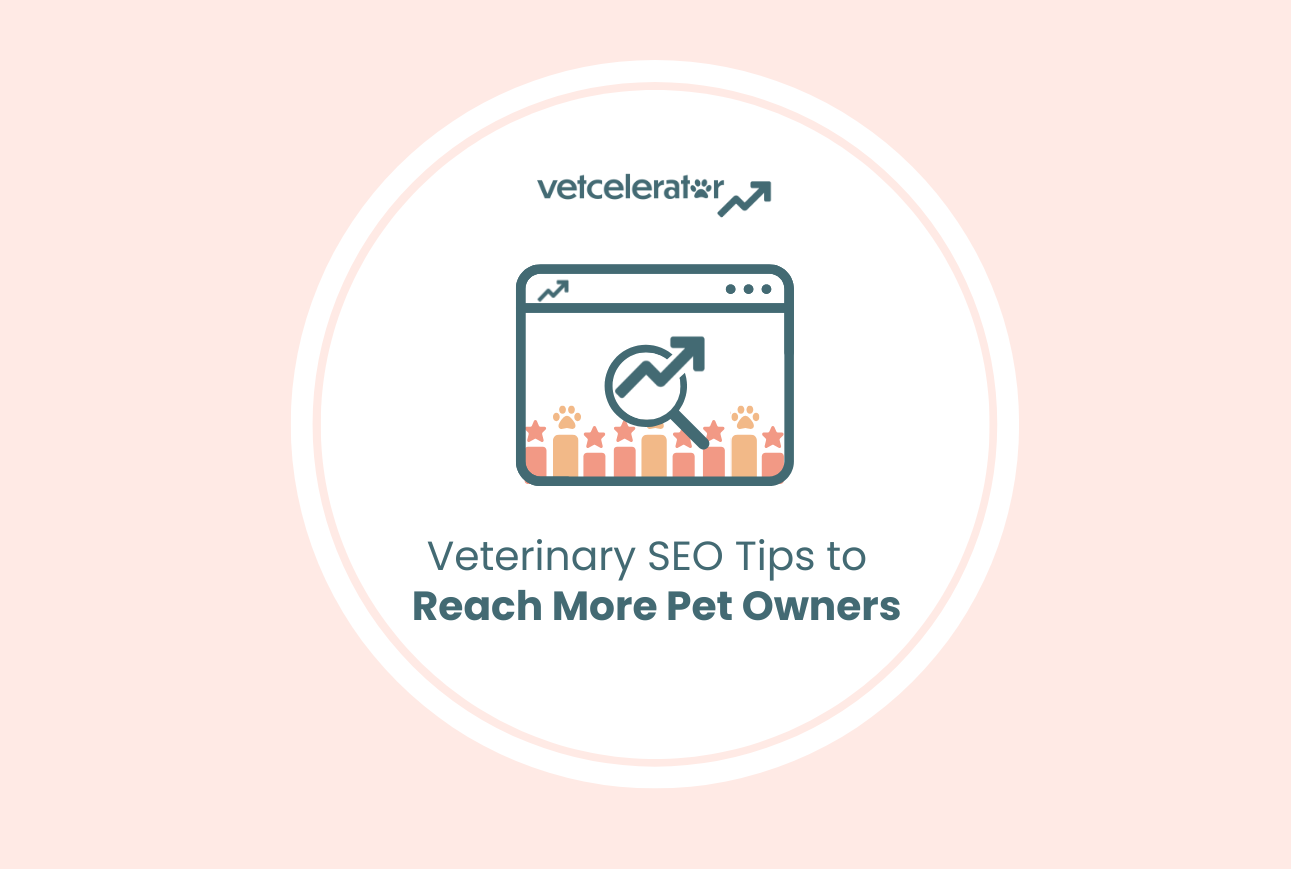
SEO is everyone’s favorite, least favorite topic. Most veterinary business owners know SEO matters, but don’t know what it is or if their website’s SEO is getting done right. Too often, clinics treat SEO as a checkbox, which results in missed opportunities and low visibility online.
What is SEO?
Search Engine Optimization (SEO) is how your veterinary website earns visibility in search engines like Google, without paying for ads. It can encompass technical structure, keyword strategy, and content alignment that work together to drive organic traffic and attract local pet owners.
A common question we hear at Vetcelerator is: “Do you do SEO?”
Our answer: Yes, we cover some aspects of SEO for veterinary clinics, but probably not in the way you’re thinking.
The 4 Buckets of Veterinary Website SEO
- Keyword SEO: Find the exact words your ideal clients are searching for. These are often service-specific, like: “TPLO Surgery,” “Dog Grooming Near Me,” “24-Hour Emergency Vet Baltimore.”
- On-Page SEO: Optimize each webpage to speak directly to search engines and humans; title tags, headings, content, and metadata all play a role.
- Off-Page SEO: Grow your site’s authority through backlinks, social proof, and third-party mentions from reputable sites and local sources.
- Technical SEO: Structure your site for performance, which includes mobile responsiveness, fast loading speeds, secure architecture, and search engine crawlability.
Keyword Research for Veterinary SEO
Keywords are usually what most people think of when it comes to SEO. Keyword research is the “What” you want to rank for in the search results.
Start with a primary keyword for each page (e.g., “pet surgery”) and then group secondary keywords that support it. These keywords can be service-related, location-based, or frequently searched variations (e.g., “veterinary surgeon in Houston,” “surgery for dogs,” “affordable pet mass removal”).
Keyword research is a strategy that involves identifying the keywords and phrases that you want to rank for in search engine results. Keyword Ranking or Keyword Position is the order in which your website is shown for the keyword in the SERP (search engine results page).
There are several highly credible free and paid tools you can use to build a keyword list and analyze the keywords on your website. Here are just a few:
The research side involves understanding which keywords and phrases are used naturally and their potential search volume. It will also involve tracking keywords over time to see how positions may change. Once your keyword strategy is in place, the next step is implementation.

Ranking Tip: If your page isn’t ranking in the top 15 search results, it’s nearly invisible to your audience.
On-Page SEO

On-page SEO is implementing or “folding in” the keyword strategy. This is where your brand’s authenticity blends with the target keywords; the blend needs to feel natural and human. If the content is keyword-stuffed in an unnatural way, it will work against your SEO and could lead to a dreaded Google penalty. Here are some best practices for on-page SEO optimizations:
Before Writing
- Choose a primary keyword
- Know your page's purpose and audience
During Writing
- Use the keyword in the title (ideally in the first four words)
- Include it in the first paragraph
- Insert it into some subheadings (H2/H3)
- Use images, charts, or stats to improve readability and SEO performance

Ranking Tip: Keyword stuffing is out. Quality and relevance are in.
Off-Page SEO
Think of this as your reputation strategy. Off-page SEO builds trust with search engines and potential clients.
Key Tactics
- Participate in community events that may earn press coverage or backlinks
- Guest blog, co-host podcasts, or collaborate with local influencers
- Secure backlinks from high-quality, non-competitive websites
- Monitor your backlinks regularly to protect your site’s trust score

Ranking Tip: A steady stream of reputable links strengthens your ranking and positions your clinic as a leader in your local market.
Technical SEO
Even the best content won’t rank if your website isn’t technically sound. Technical SEO focuses on the site’s accessibility for humans and bots, and your website designer should be familiar with how this works. Ask these five questions before choosing a veterinary website designer.
Technical SEO for veterinary websites includes:
- Mobile and Responsive Optimization: Make your veterinary website work seamlessly on all devices to improve user experience and Google search rankings.
- Compliance and Accessibility: Your site should meet ADA standards so all users, including those with disabilities, can navigate and interact effectively.
- Structured Metadata: Good metadata will help search engines better understand and display your site content in search results.
- Breadcrumbs, Sitemaps, & Indexing: Organize your site for users and search engines to support navigation, crawlability, and proper indexing.

Ranking Tip: Search engines prioritize websites that load fast, work on all devices, and are easy to crawl. If your site isn’t optimized technically, even great content won’t rank.
Veterinary SEO is Ongoing
Search engines and competitors are always updating and optimizing. A “set it and forget it” mindset won’t work here. Staying current and staying on top of search results go hand in hand. Successful SEO for veterinary clinics requires an on-page and off-page strategy with measurable goals that are revisited and re-evaluated.

Ranking Tip: Vetcelerator knows this and runs routine audits on all veterinary websites we build.
Website SEO with Vetcelerator
We specialize in building and hosting veterinary websites that are made for search performance by specifically delivering on the technical SEO aspect of the “four buckets” of veterinary SEO. Every site we build is optimized for:
- Fast load speed
- Mobile and desktop performance
- Technical SEO best practices
Want to know how your site is doing?
Request a free website audit today and see how Vetcelerator can help your practice rank higher, connect with more local pet owners, and grow with clarity.




